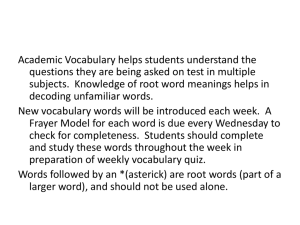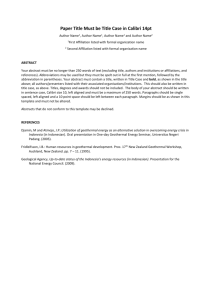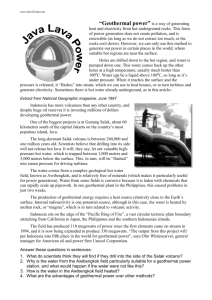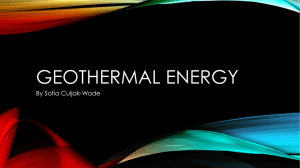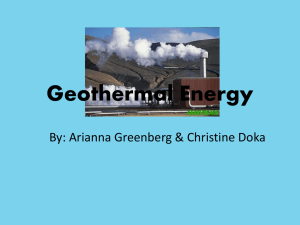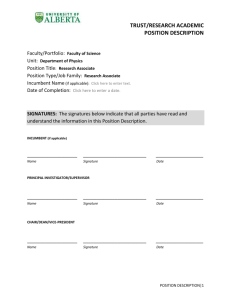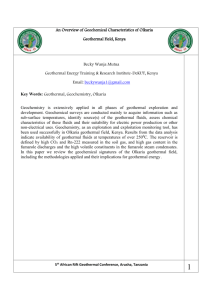Geothermal Energy
advertisement
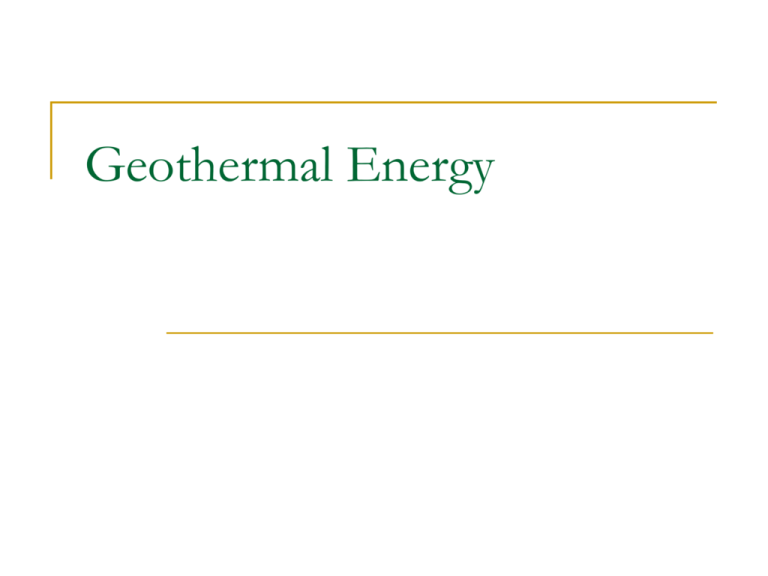
Geothermal Energy http://geothermal.inel.gov/publications/future_of _geothermal_energy.pdf A Brief History of Geothermal Energy Use Used by most if not all early civilizations for cooking, bathing, and heating. First used for electric power in Lardello, Italy in 1913 Did not spread to the rest of the world until 1932 All pumps before 1960 were of the basic dry steam design Global Climate Change: Why We Should Fear It Rising CO2 levels contribute to a change in global climates Non-renewable energy sources such as fossil fuels and coal result in a large amount of CO2 waste products Global Climate Change has been predicted to result in a number of issues such as flooding of costal areas, higher allergen production, a grater risk of food poisoning, a grater risk of water-borne infection (particularly Cholera in costal/estuarine areas), grater risk of vector borne infection, reduction in crop yields, decline in local fisheries, population displacement and salinisation of freshwater and/or costal soil Geothermal Energy: An Overview Energy results from the heat deep benith the Earth’s surface Higher temperature areas can be used to generate energy Lower temperature areas can be put to “direct use” Geothermal Energy can be harnessed almost anywhere in the world through the use of geothermal heat pumps http://www.sciencedirect.com/science?_ob=ArticleURL&_udi=B6VCN-499F4RS2&_user=961305&_coverDate=12%2F31%2F2003&_rdoc=1&_fmt=high&_orig=search&_sort=d&_docanchor=&view=c&_acct=C000049425&_version= http://geoheat.oit.edu/bulletin/bull28-2/art1.pdf Initially all plants were dry steam plants In 1960, a flash steam plant was constructed in New Zealand Currently, the most effective model is the binary method Dry Steam http://geoheat.oit.edu/bulletin/bull28-2/art1.pdf Flash Steam http://geoheat.oit.edu/bulletin/bull28-2/art1.pdf Binary http://geoheat.oit.edu/bulletin/bull28-2/art1.pdf Other innovations in Geothermal Technology Can substitute normal water in plant with recycled wastewater First attempted at a geothermal energy plant in California known as “The Geysers” http://www.sciencedirect.com/science?_ob=ArticleURL&_udi=B6VCN-499F4RS2&_user=961305&_coverDate=12%2F31%2F2003&_rdoc=1&_fmt=high&_orig=search&_sort=d&_docanchor=&view=c&_acct=C000049425&_version=1 &_urlVersion=0&_userid=961305&md5=4f6cebb11578cf4f1a46755ca2008673 Works Consulted Barbier, Enrico. “Geothermal energy technology and current status: an overview.” Renewable and Sustainable Energy Reviews 6.1-2 (2002): 3-65. ScienceDirect. Web. 22 Feb. 2010. <http://www.sciencedirect.com/science?_ob=ArticleURL&_udi=B6VMY-458PGSM1&_user=961305&_coverDate=12%2F31%2F2002&_rdoc=1&_fmt=high&_orig=search&_sort=d&_docanchor=&view=c&_searchStrId=1217927517&_re runOrigin=scholar.google&_acct=C000049425&_version=1&_urlVersion=0&_userid=961305&md5=420d457cdf1f3a9388910f807718e9ea>. Brown, Lester. Plan B 3.0 Mobalizing to Save Civilization. New York: W. W. Norton & Company, Inc., 2008. PDF file. Caldeira, Ken, Atul Jain, and Martin Hoffert. “Climate Sensitivity Uncertainty and the Need for Energy Without CO2 Emission .” Science 299 (Mar. 2003): 2052 - 2054. AAAS. Web. 22 Feb. 2010. <http://www.sciencemag.org/cgi/content/full/299/5615/2052>. Fridleifsson, Ingvar. “Geothermal energy for the benefit of the people.” Renewable and Sustainable Energy Reviews 5.3 (200): 299-312. ScienceDirect. Web. 22 Feb. 2010. <http://www.sciencedirect.com/science?_ob=ArticleURL&_udi=B6VMY-430GD994&_user=961305&_coverDate=09%2F30%2F2001&_rdoc=1&_fmt=high&_orig=search&_sort=d&_docanchor=&view=c&_searchStrId=1217924713&_re runOrigin=scholar.google&_acct=C000049425&_version=1&_urlVersion=0&_userid=961305&md5=bf266963199646a8e7ebcc22c9b16ff3>. The Future of Geothermal Energy: The Future of Impact of Enhanced Geothermal Systems (EGS) on the United States in the 21st Century. MIT.edu. Massachusetts Institute of Technology, n.d. Web. 22 Feb. 2010. <http://geothermal.inel.gov/publications/future_of_geothermal_energy.pdf>. “Geothermal Energy Facts.” Geothermal Education Office. N.p., 13 Jan. 2004. Web. 22 Feb. 2010. <http://www.geothermal.marin.org/geoenergy.html>. “Geothermal Heat Pumps.” US Department of Energy: Energy Efficency and Renewable Energy. US Department of Energy, 7 July 2009. Web. 22 Feb. 2010. <http://www1.eere.energy.gov/geothermal/heatpumps.html>. Lund, John. “CHARACTERISTICS, DEVELOPMENT AND UTILIZATION OF GEOTHERMAL RESOURCES.” GHC BULLETIN (June 2007): n. pag. Web. 22 Feb. 2010. <http://geoheat.oit.edu/bulletin/bull28-2/art1.pdf>. - - -. “The USA geothermal country update.” Geothermics 32.4-6 (2003): 409-418. Web. 22 Feb. 2010. <http://www.sciencedirect.com/science?_ob=ArticleURL&_udi=B6VCN-499F4RS2&_user=961305&_coverDate=12%2F31%2F2003&_rdoc=1&_fmt=high&_orig=search&_sort=d&_docanchor=&view=c&_acct=C000049425&_version= 1&_urlVersion=0&_userid=961305&md5=4f6cebb11578cf4f1a46755ca2008673>. Lund, John, and Derek Freeston. “World-wide direct uses of geothermal energy 2000.” Geothermics 30.1 (2001): 29-68. ScienceDirect. Web. 22 Feb. 2010. <http://www.sciencedirect.com/science?_ob=ArticleURL&_udi=B6VCN-423HHSR2&_user=961305&_coverDate=02%2F28%2F2001&_rdoc=1&_fmt=high&_orig=search&_sort=d&_docanchor=&view=c&_searchStrId=1217931731&_re runOrigin=scholar.google&_acct=C000049425&_version=1&_urlVersion=0&_userid=961305&md5=720ef1fb6459b61f764e749eb28f8a2d>. McMichael, Anthony, Rosalie Woodruff, and Simon Hales. “Climate change and human health: present and future risks.” The Lancet 367.9513 (2006): 859-869. ScienceDirect. Web. 22 Feb. 2010. <http://www.sciencedirect.com/science?_ob=ArticleURL&_udi=B6T1B-4J7B1171&_user=961305&_coverDate=03%2F17%2F2006&_rdoc=1&_fmt=high&_orig=search&_sort=d&_docanchor=&view=c&_searchStrId=1217907382&_re runOrigin=scholar.google&_acct=C000049425&_version=1&_urlVersion=0&_userid=961305&md5=d5c2f77a380705ef78abd0bfd1d233b6>.
